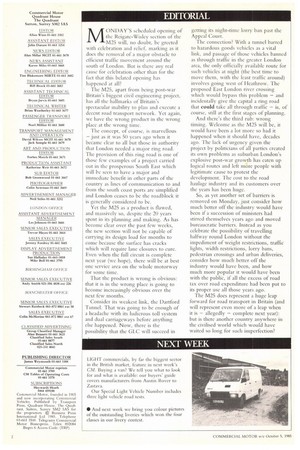EDITORIAL
Page 4

If you've noticed an error in this article please click here to report it so we can fix it.
MONDA Y'S scheduled opening of the Reigate-Wisley section of the M25 will, no doubt, be greeted with celebration and relief, marking as it does the removal of a major obstacle to efficient traffic movement around the south of London. But is there any real cause For celebration other than for the fact that this belated opening has happened at all?
The M25, apart from being post-war Britain's biggest civil engineering project, has all the hallmarks of Britain's spectacular inability to plan and execute a decent road transport network. Yet again, we have the wrong product ill the wrong place at the wrong time.
The concept, of course, is marvellous — just as it was 50 years ago when it became clear to all but those in authority that London needed a major ring road. The provision of this ring road is one of those few examples of a project carried out in the prosperous South East which will be seen to have a major and immediate benefit in other parts of the country as lines of communication to and from the south coast ports are simplified and London ceases to be the roadblock it is generally considered to be.
Yet the M25 as a product is flawed, and massively so, despite the 20 years spent in its planning and making. As has become clear over the past few weeks, the new section will not be capable of carrying its design load for months to come because the surface has cracks which will require lane closures to cure. Even when the full circuit is complete next year (we hope), there will be at best one service area on the whole motorway For some time.
That the product is wrong is obvious: that it is in the wrong place is going to become increasingly obvious over the next few months.
Consider its weakest link, the Dartford Tunnel. That was going to be enough of a headache with its ludicrous toll system and dual carriageways before anything else happened. Now, there is the possibility that the GLC will succeed in getting its night-time lorry ban past the Appeal C:ourt.
The connection? With a tunnel barred to hazardous goods vehicles as a vital link, and passage of those vehicles banned as through traffic in the greater London area, the only officially available route for such vehicles at night (the best time to move them, with the least traffic around) involves going west of Heathrow. The proposed East London river crossing which would bypass this problem — and incidentally give the capital a ring road that could take all through traffic — is, of course, still at the first stages of planning.
And there's the third rub: wrong timing. Welcome as the M25 will be, it would have been a lot more so had it happened when it should have, decades ago. The lack of urgency given the project by politicians of all parties created its own problems as suburban London's explosive post-war growth has eaten up logical routes and left inore people with legitimate cause to protest the development. The cost to the road haulage industry and its customers over the years has been huge.
So, as yet another set of barriers is removed on Monday, just consider how much better off the industry would have been if a succession of ministers had stirred themselves years ago and moved bureaucratic barriers. Instead as you celebrate the possibility of travelling halfway round London without the impediment of weight restrictions, traffic lights, width restrictions, lorry bans, pedestrian crossings and urban deliveries, consider how much better off the industry would have been, and how much more popular it would have been with the public, if all the excess of road tax over road expenditure had been put to its proper use all those years ago.
The M25 does represent a huge leap forward for road transport in Britain (and will represent even more of a leap when It is — allegedly — complete next year): but is there another country anywhere in the civilised world which would have waited so long for such imperfection?












































































































